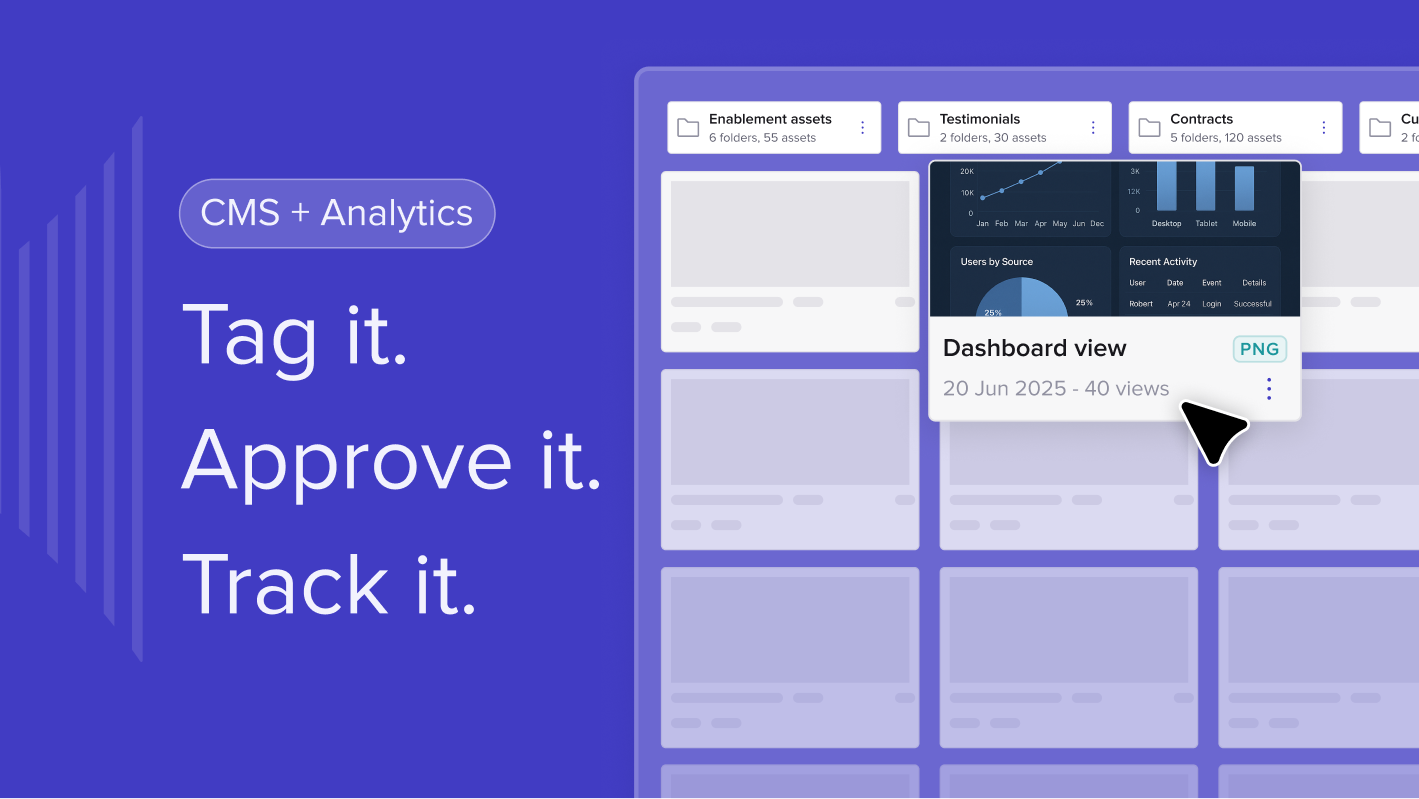Key takeaways
- Real champions have power, influence and a personal stake
- Qualify emotional buy-in, not just titles
- Use champion calls, value plans and tailored content
- Equip champions with tools to sell internally
- Friendly contacts ≠ true champions
How do you sell when you’re not even in the room?
That’s the question we tackled in episode two of our Sales Symphony series, featuring two powerhouse voices in modern sales:
- Morgan J. Ingram, CEO of AMP
- Alex Olley, Co-Founder and CRO at Reachdesk
(David Katz, VP of Corporate Sales at HubSpot, was due to join but couldn’t make the session - he was missed, but the conversation didn’t miss a beat.)
Deals don’t close because of great demos, (although that of course helps), they close because a champion inside the buyer’s org gets behind your solution and sells it for you. But how do you build, qualify, and enable true champions?
This episode dives into the real traits of high-impact champions and the tools and tactics that help them sell when you’re not there.
Whether you’re an AE trying to navigate internal politics, SDR or a sales leader building enablement playbooks we think you'll really like this episode.
Key takeaways
- Real champions have power, influence and a personal stake
- Qualify emotional buy-in, not just titles
- Use champion calls, value plans and tailored content
- Equip champions with tools to sell internally
- Friendly contacts ≠ true champions
Highlights from the conversation:
- Morgan J. Ingram shared actionable tips on leveraging technology without losing the human touch. He emphasised the importance of coaching, continuous learning, and creating a feedback-rich environment.
- Alex Olley discussed the power of gifting and creative outreach in building authentic connections. He also shared how data-driven insights can help sales teams prioritise the right opportunities and deliver value at every touchpoint.
A true champion is someone inside the buyer’s organisation who will sell your solution when you're not in the room. They're motivated by the impact your product will have on their team, goals or career.
“A champion without power or interest is just a coach.” – Morgan J. Ingram
They’re not just cheering from the sidelines, they’re actively navigating blockers, looping in decision-makers, and creating internal momentum.
Role of Digital Sales Rooms
A recurring theme in the discussion was the power of Digital Sales Rooms, like trumpet, to centralise and organise the champion enablement process. Instead of scattering assets across endless email threads, sellers can use a digital sales room to house everything a champion needs: business cases, ROI calculators, case studies, and timelines, all in one secure, easily shareable link.
This not only makes it easier for champions to access and present materials internally, but also signals professionalism and organisation. You'll also gain all insights into the Digital Sales Room or Pod as we call them, who clicked on what, when and for how long- meaning you can tailor your follow ups accordingly.
What is an internal champion?
A true champion is someone inside the buyer's organisation who will sell your solution when you're not in the room.
“A champion without power or interest is just a coach.” – Morgan J. Ingram
Champions aren’t just fans of your product. They:
- Have internal influence and credibility
- Share insights that help your pitch
- Help navigate internal politics and decision-making
- Have something to gain from your solution
How can you tell if someone is actually a champion?
Not all friendly contacts are champions. Salespeople often confuse enthusiasm with influence. But it’s action and access that define a real champion. According to Ingram and Olley, a few key behaviours separate real champions from passive supporters.
Signs you’ve got a true champion:
- They introduce you to other stakeholders
- They share internal objections or buying criteria
- They’re willing to rehearse your pitch back to you
- They help shape the business case or proposal
Red flags:
- They avoid internal introductions
- They’ve never been part of a buying decision
- They “love it” but take no action
“If they won’t go out on a limb for you, they’re not a champion.”
What questions should you ask to qualify a champion?
Alex Olley recommends moving beyond job titles and asking about emotional buy-in and influence.
Use direct, tactical questions:
- “Who else will need to approve this?”
- “What happens if this doesn’t get signed off?”
- “Are you comfortable presenting this internally?”
- “Can I help you prep for the meeting with your boss?”
How do you equip a champion to sell internally?
Champions need more than encouragement, they need assets and language that help them sell on your behalf.
“Don’t just send pricing. Show them how they’re going to win.” – Morgan J. Ingram
Sales collateral that works:
- 1-page business case (written in their voice)
- ROI calculator or performance data
- Competitor positioning to support urgency
- Case studies relevant to their pain
- A digital sales room (like trumpet) to centralise everything
What is a “Champion call” and why should you book one?
Before a key internal meeting or proposal, Ingram suggests a short 15-minute call with your champion to prep them.
In the call:
- Ask them to “sell the solution back to you”
- Role-play internal objections
- Test how well they understand the business case
- Identify any gaps in language or confidence
“If they can’t confidently sell it, it’s not ready.”
Should you build a Mutual Action Plan with champions?
Yes and do it early. Olley recommends creating a co-built plan with milestones not just for the sales process, but for post-sale success.
What to include:
- Go-live targets
- Internal milestones
- Success metrics
- Stakeholder responsibilities
- Timeline to first value
“Make it about value, not just the close date.”
What if the deal stalls?
Sometimes deals lose steam. That’s when you might need to activate a champion letter, a short, personal email sent from a senior exec on your team to your champion’s boss.
This message:
- Commends your champion’s involvement
- Reaffirms the core business problem
- Highlights the urgency of the solution
- Reopens dialogue with a senior stakeholder
This strategy can unblock stalled deals and unlock senior access.
What it does:
- Commends your champion’s involvement
- Reaffirms the core business problem
- Highlights the urgency of the solution
- Reopens dialogue with a senior stakeholder
This tactic shows respect for internal dynamics, builds credibility, and can often unlock access to higher-level decision-makers.
Example of a champion letter:
“Hi [Boss’s Name],
I’ve been working closely with [Champion] on solving [pain point]. They’ve shown a strong understanding of the challenge and have been instrumental in driving momentum on your side.
I’d love to connect briefly to share how we can help you achieve [desired outcome] and align on next steps. What’s the best way to get on your radar?”
It’s subtle, respectful, and powerful and often just the nudge a stalled deal needs to get back on track.
Can you have more than one champion?
Absolutely. In fact, the most successful sellers build a “bench of champions” across different departments and levels.
Just ensure each one meets the champion criteria:
- Influence
- Buy-in
- Motivation to act
Why does the communication channel matter?
Channel = commitment level.
“If they give you their mobile number, they’re probably invested.”
In order of buy-in:
- Text/WhatsApp – highest commitment
- Slack (if internal access granted)
- LinkedIn DMs – moderate
- Email – standard
- CRM or booking link – lowest
Always get permission before messaging off-platform.
Missed the Episode?
Don’t worry! You can catch the full replay and stay tuned for more episodes in the Sales Symphony series, where we’ll continue to explore what it takes to succeed in modern sales.
Join the Conversation
What questions do you have about building a high-performing sales team? Share your thoughts in the comments or connect with us on LinkedIn.
Stay tuned for Episode 3!
FAQs
How can I equip my champion to sell internally?
Provide your champion with a concise, tailored business case written from their perspective, not yours. Use Mutual Action Plans to map out steps to value, and consider scheduling a short call where your champion “pitches back” your solution to ensure they’re ready to advocate internally.
Should I involve my champion in pricing discussions?
Yes but position pricing within a value context. Get their input on what their team cares about, and equip them to sell the ROI internally.
What tools help support champions?
Platforms like trumpet let you create custom Digital Sales Rooms, a single link for collateral, timelines and business cases. It makes your champion’s job easier.
Can junior employees be champions?
Yes, if they have influence and initiative. But always validate their ability to sway decision-makers or escalate internally.

.svg)
.svg)
.svg)
.svg)
.svg)
.svg)
.svg)
.svg)
.svg)
.png)
.svg)
.svg)
.svg)
.svg)

.svg)
.svg)
%201.svg)
.svg)
%201.svg)



.svg)




.png)

















![How to Get Started with Buyer Enablement [With Examples]](https://cdn.prod.website-files.com/65cf4fecbed2754c2236665d/65cf4fecbed2754c22366bdb_65a5af83e742f76e34ce06f3_Customer%2520Onboarding%2520_%2520Everything%2520you%2520need%2520(2).png)
.png)



.png)



.png)









.png)


.png)

.png)
.png)







